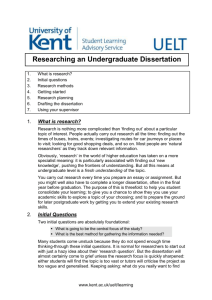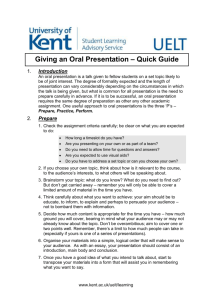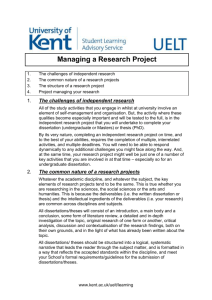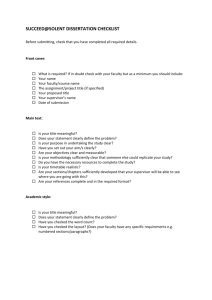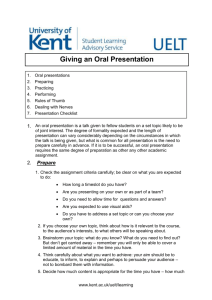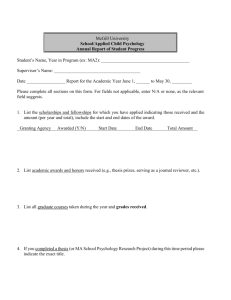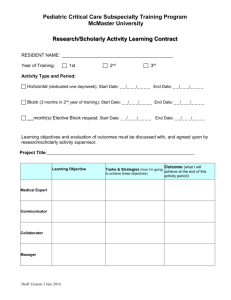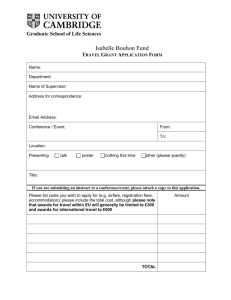Postgraduate research
advertisement
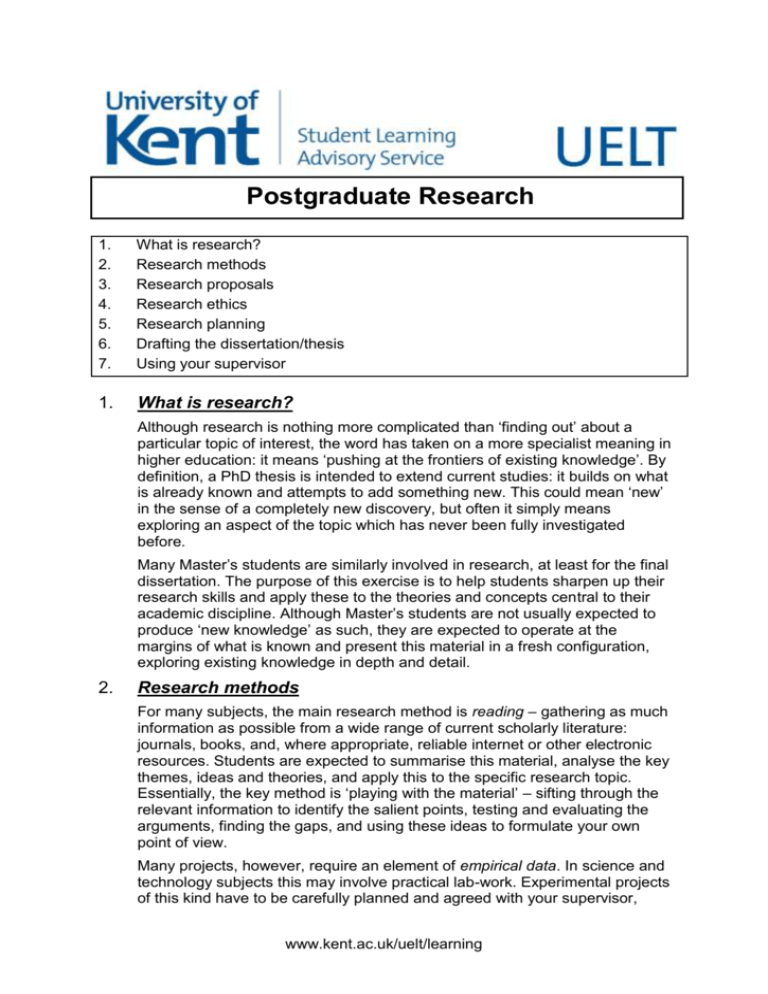
Postgraduate Research 1. 2. 3. 4. 5. 6. 7. What is research? Research methods Research proposals Research ethics Research planning Drafting the dissertation/thesis Using your supervisor 1. What is research? Although research is nothing more complicated than ‘finding out’ about a particular topic of interest, the word has taken on a more specialist meaning in higher education: it means ‘pushing at the frontiers of existing knowledge’. By definition, a PhD thesis is intended to extend current studies: it builds on what is already known and attempts to add something new. This could mean ‘new’ in the sense of a completely new discovery, but often it simply means exploring an aspect of the topic which has never been fully investigated before. Many Master’s students are similarly involved in research, at least for the final dissertation. The purpose of this exercise is to help students sharpen up their research skills and apply these to the theories and concepts central to their academic discipline. Although Master’s students are not usually expected to produce ‘new knowledge’ as such, they are expected to operate at the margins of what is known and present this material in a fresh configuration, exploring existing knowledge in depth and detail. 2. Research methods For many subjects, the main research method is reading – gathering as much information as possible from a wide range of current scholarly literature: journals, books, and, where appropriate, reliable internet or other electronic resources. Students are expected to summarise this material, analyse the key themes, ideas and theories, and apply this to the specific research topic. Essentially, the key method is ‘playing with the material’ – sifting through the relevant information to identify the salient points, testing and evaluating the arguments, finding the gaps, and using these ideas to formulate your own point of view. Many projects, however, require an element of empirical data. In science and technology subjects this may involve practical lab-work. Experimental projects of this kind have to be carefully planned and agreed with your supervisor, www.kent.ac.uk/uelt/learning paying particular attention to health and safety issues. In many other cases, students will need to collect other forms of empirical data. Broadly, there are two main approaches to this: Quantitative methods involve the collection of numerical data through surveys (e.g. counting the number of people involved in an activity, or counting the number of lorries driving up a particular road, etc.), questionnaires (how many people do/think x, y and z?) or specific technical instruments which have been devised for the purpose (e.g. psychological texts). The key focus in quantitative studies is the ability to count things. Sometimes a simple count is all that is needed, but further statistical analysis is often required. Qualitative methods grew out of the social sciences as a way of gathering more nuanced information about particular situations or topics. Qualitative approaches tend to be less interested in numbers and more interested in the way individuals or small groups understand their experience. The data required for this may be gathered through semi-structured interviews, case studies, reflective practice, or simple observation. Detailed records are kept of these encounters, which are usually transcribed and then analysed in a search for trends and patterns. Both traditions have strengths and weaknesses: The strength of the quantitative approach is that it produces hard data which can be statistically manipulated and generate generalisable conclusions provided certain criteria are met (reliability, validity, probability theory, and so on). A major weakness of the quantitative approach follows on closely from this: it tends to ‘average out difference’ – that is, it tends to iron out variation in the data as much as possible. Qualitative approaches are the mirror image: they are extremely good at bringing out difference and highlighting the significance of the detail. The major weakness follows on: all this detail has to be carefully interpreted (which is why this is sometimes called the ‘hermeneutical tradition’) and leaves the researcher open to the charge that their findings are entirely subjective. As a result, quantitative researchers tend to write off qualitative methods as ‘soft’ and ‘fluffy’, lacking in objectivity. Qualitative researchers tend to reply by saying all analysis is subjective and even ‘hard statistics’ are notoriously open to spin! It is also worth remembering that the attention to detail required in this tradition comes with a cost: it can be very timeconsuming and requires intense concentration on what is actually being said. These differences reflect the different origins of the two methods; the quantitative tradition grew out of the physical sciences and places a particular emphasis on ‘facts’; the qualitative tradition grew out of the human sciences, particularly Social Anthropology, and this is a tradition which argues that there are no objective facts, only rich and nuanced detail. Increasingly, the ‘war of methods’ seems to be passing and many researchers combine both approaches, using some quantitative techniques for headline information and some qualitative techniques for the detail. All in all, choice of method is one of the critical decisions to be made in the early stages of a research project, and you will need to consult some of the many textbooks on empirical research and discuss this carefully with your supervisor before the initial Research Proposal is drawn up. www.kent.ac.uk/uelt/learning The key issue is simple: is your proposed method ‘fit for purpose’? Will it do the job and produce the information you need for your research project? 3. Research proposals Research Proposals are an important first step in any research project. The process of drafting a proposal and then having to negotiate a way forward can feel frustrating, but there are at least three reasons why this needs to be done carefully: Your supervisor has the responsibility of checking that your proposal meets the academic requirements of your course, and it is better to find this out sooner rather than later, before you do all the hard work! Your supervisor will want to know that the project is ‘do-able’ – that is, that you can achieve what you say you want to achieve in the time and with the resources available Going on from this, many initial ideas for research are far too broad and general; a successful research project needs a sharp focus – a specific ‘research question’. The key issue is what exactly do you want to find out? Writing the Research Proposal is part of the process of sharpening up your own thinking about this Departmental procedures for Research Proposals vary across the university. ALWAYS check your course documentation for precise information about the forms to be completed and deadlines for submission. If in doubt, check with your supervisor. 4. Research ethics It might seem obvious that scientific or medical experiments could cause damage or present health risks, but even the simplest social inquiry can have an impact on people. For this reason, all research institutions – including universities – have rules which require everyone to get ethical clearance before working on anything involving ‘human participation’. This applies to all students working for postgraduate qualifications. Every Faculty in the University of Kent has its own arrangements to scrutinise research proposals. Please see the relevant faculty website for more detailed information. Broadly, however, students are required to show that they have thought through the issues and carried out a simple risk assessment: why kind of damage might your project cause potentially to other people, and what steps have you taken to ensure due diligence in preparing your study? Usually, students are required to fill out a simple form asking some of the basic ethical questions. This must be completed and returned to the relevant Research Ethics Committee. Students should not start gathering any data until the project has received clearance, and please be aware that Research Ethics Committees may ask for modifications to be made before you go ahead. It is essential to plan for this well in advance and include enough time for this process in your project schedule. In general, research ethics revolve around three key principles: the autonomy of individual participants, the duty of beneficence, and care of collected information. In practice this means: www.kent.ac.uk/uelt/learning 5. That the human dignity of participants must be fully respected; research questions should not be unnecessarily intrusive or offensive That the researcher intends no harm to the participant That participants give ‘informed consent’ That participants should be given appropriate levels of feedback – for example, copies of any transcripts made from interviews, an opportunity to correct any factual errors, and that they should be aware of any publications that might come out of the finished study That all personal data is properly safeguarded – confidentiality is respected, names and background details are disguised, and records kept securely under the terms of the Data Protection Acts Research planning Research projects typically take a long time – often longer than you might think, especially if empirical data is involved. Good planning and effective time management are thus essential. Work back from the final deadline and always build in ‘emergency time’: remember, whatever can go wrong usually does go wrong, so be prepared for illness, computer problems, family or work crises and so on. You will also need time to draft and edit initial versions of the report and ‘thinking time’ – time to become familiar with the key themes and ideas and to process your own understanding of the facts and data you have collected. A significant amount of time will be needed for the literature search and review, particularly if you are a slow reader. But remember the tricks of the trade: be ruthlessly targeted in your reading - what do you really need to look at? Do you need to read every word of every book, or do you only need part of a section or chapter? Use the index and contents pages to narrow down the focus. Similarly, with journal articles, use the abstract to check out whether or not the article will help with this specific project. Keep notes of all your reading – partly as a way of starting to process the information, and partly as an aide-de-memoire. It is crucially important that you keep a clear record of all the bibliographic information and page numbers you will need for your references. When you have collected as much background material as possible, produce a digest of the salient points. What is directly relevant to your research, and what is merely secondary? Make sure all your reading and thinking is sharply focused on the specific research project in hand. If your research involves empirical data you will need to get on with this alongside your reading. Data gathering and processing takes time: allow enough time for the interviews or questions, or whichever empirical method you chose to use. If you plan to use a questionnaire, you will almost certainly need to carry out a pilot study to test out the draft. This will give you an opportunity to check that the questionnaire works and produces the required information. You can then make adjustments as necessary. A similar process may be required for www.kent.ac.uk/uelt/learning structured interviews, though piloting is less important if you are using a semistructured approach or working on a single case study. Interviews can be labour-intensive: not only will the interview take time, but it will probably be necessary to produce a transcript afterwards. The amount of time needed can vary, depending on your typing speed and so on. But be warned: transcription is a slow process. Then you need to allow plenty of time for analysis. Even with the aid of computer programmes such as SPSS or Nvivo, the collation and analysis of empirical data is a long process and has to be done carefully. Finally, you need ‘process time’ for thinking through what the data is saying. The key issue at this stage is to set up a kind of dialogue between the theories and ideas set out in the literature and the results of your own research: does your data confirm or challenge the ideas put forward in the literature? What are your own theories? Where is the evidence you need to support your ideas? How else might this data be interpreted, and so on. Only now are you in a position to start drafting the report or dissertation and piece together the material into a coherent presentation. This presentation will be clearly structured, with good summaries at key points. There will be clear links between the sections, with everything set out in a logical order. Make sure the ‘flow of thought’ really works! In short, a good dissertation or thesis takes time: a lot of time. Start well in advance of the deadline, draw up a schedule of personal targets and goals something like this: I will finish the... Research proposal Research Ethics submission Literature search and reading Empirical data gathering Data analysis Processing the ideas and evidence Drafting the initial report Edit and revise initial draft Submit finished product by.... given deadline given deadline so many weeks (set own realistic deadline) so many weeks (set own realistic deadline) set own deadline set own deadline set own deadline set own deadline given deadline And remember to allow for slippage: it will not go smoothly. Check the ‘doability’: can you actually achieve these targets and still deliver the final project on time? If not, you may need to adjust the schedule. Remember to leave plenty of time for work, holidays, family commitments, and so on. But in the end, the only thing that will actually make this work will be your own selfdiscipline. Without that, it is all likely to go pear-shaped... 6. Drafting the dissertation/thesis Prepare a thesis/dissertation plan, setting out the data you have collected in the required format for your particular project (ALWAYS go back at this stage and re-read the instructions given at the start of the project. ALWAYS do what it says). A fairly typical dissertation will probably follow a pattern something www.kent.ac.uk/uelt/learning like this: 7. Introduction: set the scene for the research project and show why it is important and/or interesting and indicate any problems or gaps in the current knowledge Set out a summary of your chosen method – and give a rationale: why did you choose this approach, and can you justify its use in this particular project? What alternative methods might have been used, and why were they not chosen? Literature review: a brief summary of the key points made in the books and journals consulted, and a critique – do these ideas or theories work, and why/why not? What kind of picture emerges from this literature, and what is missing? Presentation of the empirical data (this will vary a little, depending on the quantitative or qualitative method used) Analysis of the empirical data, identifying the key themes, trends or patterns Presentation of your own findings – what do you make of this material and what evidence can you produce from the empirical data to justify your point of view? Interaction between the findings of your empirical research and the literature review Discussion of the key issues that emerge from this dialogue between data and literature Your conclusions (and check: have you actually done what you said you would do in the introduction? Have you ‘delivered the goods’?) Using your supervisor Students engaged in postgraduate research are expected to take a high degree of responsibility for their own work. In fact, postgraduates are in a sense ‘researchers-in-training’ or ‘apprentice researchers’. By completing your thesis or dissertation, you are demonstrating that you are ready to move into more demanding academic roles. The role of the supervisor, therefore, is not to direct your research. The supervisor is essentially a mentor – a senior colleague who is able to offer helpful advice from their own experience and perhaps give some immediate feedback: does your work cover the ground, are there obvious gaps, does the argument work, is the work of a satisfactory academic quality, and so on. They will advise, challenge, discuss and – if necessary! – warn. But they will not do the work for you. Normally, supervisors want to set up a kind of ‘contract’ with students at an early stage of the relationship. This ‘contract’ should clearly spell out mutual expectations: how regularly will you meet, what work does the supervisor expect to be completed in advance of each meeting, how will feedback be arranged, and so on. The supervisor will also guide you through the correct processes (for example, procedures for Masters students to upgrade to Ph.D status) and remind you of programme deadlines and regulations. Follow their advice carefully. Supervisors will expect you to be self-disciplined and motivated enough to complete work by agreed deadlines. You should therefore contact them as soon as possible if you run into problems that will make it difficult to present the work in time. Supervisors expect – and have the right to expect – a fully www.kent.ac.uk/uelt/learning professional approach from students. Similarly, you also have the right to expect a fully professional approach from your supervisor (and second supervisor, in the case of Ph.D students). This means that: You (and they) will keep appointments unless genuinely and unavoidably delayed You (and they) will keep in regular contact to check out how things are progressing You (and they) will complete agreed tasks on time You (and they) will check things out if you are uncertain about the correct process You (and they) will prepare a clear agenda for each meeting – what do you need to get from the session? You (and they) will fix dates for your next supervision each time you meet Supervisors are extremely busy people, often engaged in demanding research of their own. This does mean that they can sometimes appear elusive or difficult to contact; please be patient and persevere: email is often a better way of raising initial queries or questions, and they can then arrange an additional meeting if it is felt necessary. www.kent.ac.uk/uelt/learning
